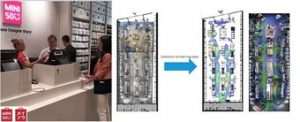
The retail industry is constantly looking to find new ways to be relevant in the ever-increasing shadow of online shopping. Researchers have predicted a 17.5 percent growth in the e-commerce share of global retail sales in 2021, rising from 13.7% in 2019. When designer brand Miniso opened new shops in Poland, they used Hikvision technology to give them the edge. Miniso turned to Hikvision AI products, with a solution built by Polish reseller Volta, including people counting cameras, fisheye cameras and NVRs.
The management team at Miniso had a number of specific questions they needed answers to in order to make the stores successful in the cut-throat high street environment. How do we know if our marketing strategy is working? What is the conversion rate of purchases? What are the ‘hot areas’ of the store, and do these actually represent best-selling products? Originally, with no access to significant information, they relied on experience and conversation with staff. But there was no way to verify these findings.
They also needed to be able to get this information remotely – i.e. management in their HQ in Warsaw wanted to be able to see the situation in the other four stores without having to visit them separately. Sometimes, they resorted to sending people to individual stores to manually count the people – a very time-consuming and costly exercise.
Miniso adopted Hikvision AI products, including people counting cameras, fisheye cameras and NVRs. These were all coordinated using the Hik-Central software platform. A people counting camera in each store counts people passing by, while another counts people entering and leaving. With this tailor-made solution management could calculate how many people were passing by to see a purchasing conversion rate. This also helps them to know whether their marketing strategy is working. They can analyse the information further to see whether the rate of people entering the store is dropping, and whether that relates to the number of those passing outside. Miniso’s management can then look into the causes of these numbers, along with sales figures, to form a picture. For example, whether there is an external factor affecting shoppers either to pass by, or to enter.
Because Miniso have the same technology set up in all the stores in Poland, they can compare different locations. This also comes in useful when it’s time to negotiate rent with shopping malls. Using ceiling installation for several fisheye cameras, the system can generate heat maps. This helps managers to see where ‘hot areas’ are, helping them to allocate products in the optimal place for promotion. Hot areas can also be compared with sales figures to provide further insights into shopping patterns.
All the information provided by the system is coordinated, and business information on both layout and original image can be overlaid in Miniso’s HQ in Warsaw. The professional video management platform allows managers to access the information from different offices and mobile applications anywhere. This makes life a lot easier for the operations team as they need to check the situation in all stores. It also means that everything can be viewed simultaneously, so they can identify trends throughout the network of stores.
Byron Zeng, Vice President of Miniso Poland, says: “The high accuracy of conversion rate the solutions provides really solves a number of our management issues. We can now easily see what’s going on in the other stores, including heat mapping, which makes management of the whole networks so much more efficient.” This is a great example of how AI surveillance products can change the landscape of business decision-making. In a fiercely competitive environment, like a shopping mall or high street, shopping trend data can help a retailer to survive. In fact, this worked so well for Miniso, they decided to use the solution in their stores across the whole of Europe – potentially about 200 stores in the next year.











